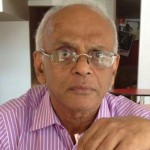The Rise Of Cultural Nationalism: Boon Or Bane?
Part I: Professor Sudatta Ranasinghe
I feel being honoured by the invitation by the PIM Alumni Association to deliver the Professor Sudatta Ranasinghe Memorial Oration 2013 which is the first in its series. I specifically consider it as a privilege that I have got to do the honours for my long-standing friend for more than four and a half decades.
Both Professor Ranasinghe and I entered the then Vidyodaya University in 1967 to follow a four year special degree programme in Public Administration, the second batch to be taken to the University under the degree’s new and expanded syllabus. Based on the performance of his A/L results, Professor Ranasinghe could have joined the University of Ceylon, Peradeniya, to do an Arts Degree, the most preferred destination for higher education by students at that time. Yet, Professor Ranasinghe chose the course in Public Administration because of his curiosity of and love for the subject, though it was risk-taking on his part since there was no certainty of securing a job after completing the degree. That was because the degree was new – an experiment that has not been tested anywhere else in a university in Sri Lanka with examinations in each of the four years. Besides this, it was not known to employers including those in the public sector. Hence, the choice of the degree programme was like entering a dark hall without knowing whether one could ever find the way out.
Getting The Balance Right – David Cameron And Foreign Relations
Cameron’s was certainly a brilliant performance, full of British bravado. Having decided, correctly in my view, that he would attend the Commonwealth Heads of Government Meeting, he had to contend with the anger of those who have in effect been running British policy with regard to Sri Lanka, which has been deeply negative about our success in overcoming terrorism in this country. He had therefore to put in an aggressive performance to keep them happy, and this he certainly did.
I do not mean only the extremist members of the diaspora, who have been enormously successful in lobbying British politicians where it matters. Having concentrated their attentions initially on Labour, and obtained brilliant results through David Miliband, they were quick to switch in 2010 when the Conservatives won, while the Sri Lankan Foreign Ministry floundered, and did not even bother to appoint a High Commissioner to England for a lengthy period.
But the efforts of the Transnational Government of Tamil Eelam and others of that ilk have been helped by a built in bias in the British Foreign Ministry, which we have not been able to correct. I believe that we had a good chance when John Rankin was appointed High Commissioner, because he has been much less prejudiced than his predecessors, but we fluffed it, and have not built up the confidence that was needed.


